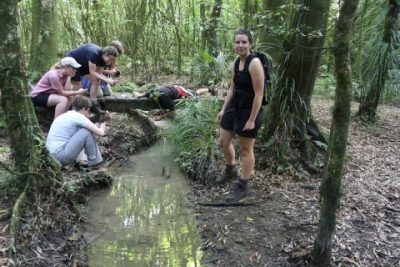Auroa School – Shakira Derbyshire

2016 | Biodiversity monitoring in New Zealand’s ecological sanctuaries
School: Auroa School
Host: Rotokare Scenic Reserve
Region: Taranaki
Auroa School is located in a rich science based area with industries such as gas, oil, conservation and dairy. The school community sees science as one of the main learning areas that it’s students need to have a thorough understanding of before attending secondary school education. The community is determined to make any necessary changes to ensure the further success of students and to help their students engage as lifelong learners in a society increasingly reliant on science and engineering. The integration of science is one of the school’s main focuses not only as a school but also as part of the ‘MOA Kluster’ which has a focus of improving the way students engage with science across a group of four rural schools.
The school firmly believes that science should not stand alone or just be a one off topic, but should be part of the fabric in everyday learning. Through the nature of science, children should continuously be making links between theory and practical based learning, and when possible linking it to their own environment. The school is excited to have the opportunity to participate in the STLP programme.
Shakira is a primary teacher in her fourth year of teaching. Prior to becoming a teacher, Shakira studied a Bachelor of Music, with a performance major (trumpet). Auroa School, where Shakira works, is a rural school and is part of a cluster of 4 schools with a STEM (science, technology, engineering and mathematics) focus. Shakira is looking forward to being able to use the rural context of the cluster to get students engaged in science investigations.
During phase one, Shakira was hosted by Rotokare Scenic Reserve Trust. Lake Rotokare is a 230 hectare, predator fenced, pest free reserve. It is home to around 56 different species of birds and lizards as well as many native plant and insect species.
During her time at Lake Rotokare, Shakira has learned about biosecurity, bird, insect and lizard monitoring, trapping, kiwi telemetry and transmitter changing, and has worked with the Rotokare education team.
She has planned and led research on the peripatus invertebrate during her time at Rotokare. Peripatus are often said to ‘be the missing link between worms and arthropods’, and referred to as ‘living fossils’, however, these descriptions are both scientifically dubious. They are ancient creatures, having barely changed in the last 550 million years. In current times, peripatus are limited to living in damp, dark habitats and have been known to be found in and under rotting logs and in leaf litter. Currently, only one species has been formally reported in Taranaki. Shakira has surveyed a number of quadrats around the Reserve, and is working to identify the presence of a possible second species in the Taranaki region. A highlight for Shakira was bringing students from Auroa School to the Reserve to help with peripatus monitoring.
Shakira has also been involved with collecting initial bird count data for the Rotokare Halo project by performing 5 minute bird counts. The ultimate purpose of this is to monitor the effectiveness of the pest control programs for maintaining or increasing native/endemic bird numbers in the areas surrounding the reserve, with the intention of creating safe places where birds can spread. She has also collated data from all these sites, and created graphs and reports to show the initial findings. She has found it particularly rewarding to have been involved right through the entire process and she hopes that she can pass on some of these new skills to students when back at Auroa School.
“The opportunity to be immersed in what scientists do has been an amazing experience, and one that will be invaluable when leading science back at school” said Shakira. “Working in the bush every day was, initially, a long way out of my comfort zone, but it has given me a new perspective on life.”
Shakira wishes to thank the staff and volunteers of Rotokare Reserve, the Ministry of Business Innovation and Employment and the Royal Society of New Zealand for making her programme possible.
